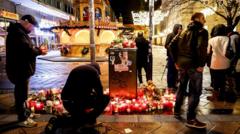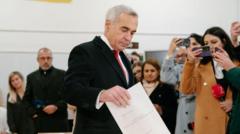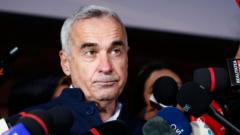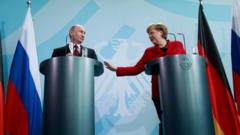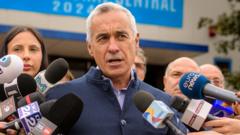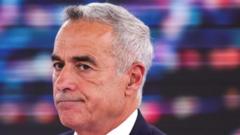Tommy Robinson, the founder of the English Defence League and a prominent figure in the far-right scene in the UK, finds himself in a legal bind as he organizes a rally while being held in custody. Counter-protests are anticipated as tensions escalate between far-right supporters and anti-racism activists.
The Rise and Controversy of Tommy Robinson in London's Far-Right Movement

The Rise and Controversy of Tommy Robinson in London's Far-Right Movement
Amidst an upcoming far-right rally in London, discontent surrounding Tommy Robinson grows as he remains in police custody facing legal charges related to libel against a refugee.
Tommy Robinson, born Stephen Yaxley-Lennon, represents a significant figure in the UK’s emerging far-right political landscape. With a history of agitation dating back to his founding of the English Defence League, Robinson has garnered a polarizing reputation, especially following a summer of anti-immigrant riots in Britain, where his name resonated among protestors.
Despite his absence from a planned rally in London due to a police custody stemming from legal issues, Robinson’s influence looms large over the event. He faces serious charges in court next week related to breaches of a 2021 injunction against libeling a Syrian refugee. This legal entanglement has made him a focal point in a narrative that pits nationalist elements against advocates for immigrants and minority rights.
The London police have anticipated a clash of ideologies on the streets this Saturday, as anti-racism activists have scheduled a counterprotest in response to Robinson’s supporters. Authorities are taking precautionary measures to ensure that the two groups remain separated, aimed at minimizing the potential for violence amidst the charged atmosphere.
Robinson's legacy, fraught with accusations of Islamophobia and association with violent protests, poses critical questions about the state of civil discourse in the UK. As he seeks to portray himself as a voice for the marginalized working class, supporters claim he is merely fighting against the establishment, while detractors see him as a harbinger of division and hatred.
The outcomes of his upcoming court hearing will further shape the dynamics of far-right activities in Britain, while the events in London serve as a litmus test for the rising tensions around immigration, nationalism, and social justice in contemporary British society.

